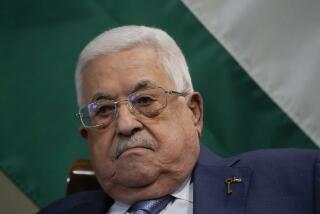Palestinian Authority Is Too Corrupt to Govern
- Share via
Even in Israel, few people doubt that in May 1999, Yasser Arafat, chairman and erstwhile president of the Palestinian Authority, will declare the establishment of the independent and sovereign state of Palestine. A grand if not dress rehearsal was held a decade ago in Algeria when a declaration of independence was read at a session of the Palestine National Council. That charade followed Jordan’s King Hussein’s announcement absolving himself of responsibility for the area recognized as the West Bank, which incidentally his grandfather annexed, an act devoid of international legality.
Arafat, despite seeming successes, foremost the creation of a beachhead on what he considers Palestinian soil, has made many mistakes over the years. For sure, many countries already acknowledge the existence of Palestine as a state. Embassies and other diplomatic trappings have served the needs of the Palestine Liberation Organization as it evolved from a terrorist organization. But to declare a state of Palestine would be a mistake if only because it would be committing the most grievous injury a leader can cause his people. I believe Palestine must be saved from itself. For if the Palestinian people are to be served and their best interests are to be catered, a separate state of Palestine is the last thing they need.
Just days ago, the much hailed Hanan Ashrawi, minister for tourism, resigned from Arafat’s new Palestinian Cabinet. Her reason? Not enough was being done to stop corruption in the Palestinian Authority. The new Cabinet has been widely criticized because last year a special internal report accused many of the ministers of corruption.
Further criticism regarding corruption came from a Palestinian human rights group that insisted that the expanded Cabinet will continue corruption and will deprive those in greatest need of their human rights.
In ignoring recommendations for change, Arafat is perceived as harming democracy. The Palestinian Authority has been accused of oppressing its people and intimidating its press.
This is not a Zionist claim but one put forth by a radical Israeli, Roni Ben Efrat, editor of the Challenge monthly, who herself spent time in prison for supporting one of the PLO groups a decade ago. In an address delivered in Athens this past May , Ben Efrat stated that imprisonment without trial is the norm. Numerous security organizations vie with one another in extortion, and big brother is everywhere. The curbing of the press is merely a part of this general picture. The most alarming aspect in the story has been the speed with which the press agreed to lay down its weapon, the pen.
Perhaps the most well-publicized incident, but not the most serious, was that of Daoud Kuttab, who runs an independent television studio. Palestinian legislators fought for the right to have their sessions broadcast directly. They finally won this at the beginning of 1997. Viewers watched with interest. Too much, it appears. When corruption was on the agenda, all kinds of static broke out on the screen. As manager of the broadcasting company, Kuttab complained about this to the Washington Post. He found himself in jail for a week.
Arafat’s Palestine, even limited as it is, is but one more authoritarian entity. The people in charge embezzle; Arab real estate agents who preferred to do business with Jews were murdered; other Arabs suspected of crimes were tortured and killed.
Israel, too, has not enjoyed the fruits of Oslo. Palestinian breaches of the accords include weapons smuggling, a larger-than-authorized police force and failure to combat terrorism. The murder of two young Jewish residents of a community in Samaria, near the large Arab city of Nablus, was not condemned by Arafat. His spokesman, Marwan Barghouti, implied that settlers, viewed as “terrorists” by Arabs, are fair game. Arafat has ignored his obligations to extradite Arab murderers of Israelis who are kept in his lax correctional units, usually with the cell doors open.
The Palestinian Authority promised to collect all illegal weapons in its territories and work together with Israel on granting gun licenses to civilians. Nothing has been done on the matter. The Palestinian police force continues to be significantly larger than was agreed on. Some of these policemen are wanted former terrorists, including some with “blood on their hands,” that is, who have killed Israelis.
Israel’s prime minister, Benjamin Netanyahu, is lambasted by U.S. State Department officials in public and behind the scenes. He is insisting on the paramount concern for Israel’s security, without which the Oslo peace process will not proceed. Netanyahu’s is a forceful voice.
But who will speak for the unfortunate Palestinians?
More to Read
Sign up for Essential California
The most important California stories and recommendations in your inbox every morning.
You may occasionally receive promotional content from the Los Angeles Times.













